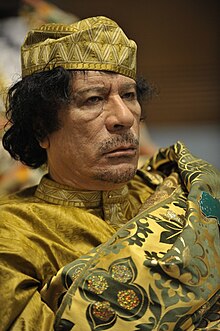Raʾīs
Ra'īs ( Arabic رئیس, DMG raʾīs ) refers to the boss or leader of a political, religious or tribal group in Arab and Islamic societies . In the Middle Ages, this was the name given to the head of a village or city in the central and eastern countries of the Islamic world. In some territories it also served as the title of ruler . The captain of a ship was also called a ra'īs. It is the name for the president in various modern states of the Middle East .
etymology
The Arabic word Raʾīs, derived from Arabic raʾs ("head"), generally designates a leader and can be translated as president (for example in the Arab Republic of Egypt ) or leader . In Persian it stands for boss . The term found its way into Urdu via Persian, where Rais is used for people of the old money nobility. The Amharic Ras is derived from the same three-consonant root <r -'- s> and refers to the politico-military dignitary of a region, especially the Negus of Ethiopia .
Occurrence
The word Raʾīs is used in all countries where Arabic is spoken. But it is also used in Southeast Asia and along the Swahili coastal strip in East Africa. As rice ( Arabic رئیس, DMG reʾīs ) it reached the Ottoman language area via Persian . In the Urdu of the Indian subcontinent, it occurs as Raees or Raeesha and denotes members of the nobility . The Urdu word raisiyyat ( Arabic رئیسيت, DMG ra'isiyyat ) can simply be represented with nobility. In rural areas of the Punjab , the word Raʾīs denotes an old tribal head or a person of the long-established land nobility, often accompanied by the adjective azam for large. In some cities in India, such as Lucknow , the term was used for members of the educated upper class.
Examples from history
In the Ottoman Empire , rice was the official name of numerous dignitaries, the most famous of which was the Reis-Effendi , the then foreign minister. The rulers of Ottoman Algeria were dubbed Rais and were endowed with a great deal of power. Several pirates from the barbarian states of Northwest Africa also carried the title of rice . In the Kingdom of Jerusalem , the Rais was Chairman of the Tribunal for Internal Affairs.
Some well-known examples are:
- Abu Uthman Said ibn Hakam al-Quraschi , first Raʾīs of Menorca (1234 to 1282)
- Abu Umar ibn Said , second and last Raʾīs of Menorca (1283 to 1287)
- Kemal Reis (1451 to 1511): Ottoman corsair and admiral, known in the West as Camalicchio
- Piri Reis (1465 to 1554): Ottoman admiral and geographer, nephew of Kemal Reis, author of Kitab-ı Bahriye ( Book of Seafaring ) and the best world map of the time
- Turgut Reis (1514 to 1565): Ottoman corsair and admiral known as Dragut
- Murat Reis the Elder (1535 to 1638): Ottoman corsair of Albanian origin
- Murat Reis the Younger , (approx. 1570 to 1641): Dutch pirate originally named Jan Janszoon , admiral and governor of the barbarian state of the Republic of Salé .
Modern
Heads of State in the Arab world are commonly addressed as Raʾīs:
- Raʾīs al-dschumhūrīya, رئيس الجمهورية , President of the Republic
- Raʾīs al-Jumhūrīya al-Jazāʾirīya, President of the Republic of Algeria
- Nāʾib ar-raʾīs, نائب الرئيس , Vice President
In the Democratic Republic of the Congo , for example, its President ( Joseph Kabila ) is informally addressed as Rais .
In the parlance of modern media, rais is mostly used for dictators of the Middle East such as B. Saddam Hussein , Baschar al-Assad , Hosni Mubarak , Abdelaziz Bouteflika , Abd al-Fattah as-Sisi or Muammar al-Gaddafi were consulted. Chiefs of criminal gangs also often bear this title. Ras also designates the person responsible for an almadraba .
literature
- Axel Havemann: “Raʾīs. 1. In the sense of “mayor” in the central Arab lands “in The Encyclopaedia of Islam. New Edition Vol VIII, pp. 402a-403a.
- Axel Havemann: Riʾāsa and qaḍāʾ. Institutions as an expression of the changing balance of power in Syrian cities from the 10th to the 12th century. Schwarz, Freiburg i.Br., 1975.
